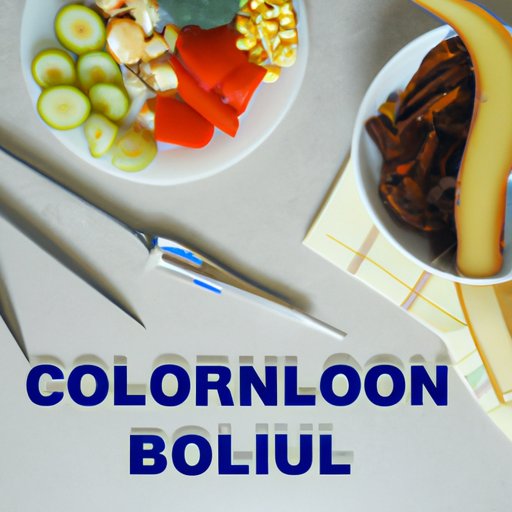
I. Introduction
Colonoscopy is a medical examination that involves the use of a flexible tube with a camera to inspect the colon or large intestine. This procedure is used to detect and prevent colon cancer, which is the second deadliest type of cancer in America. This article is intended to help you understand how to prepare for colonoscopy, including the dietary and lifestyle adjustments you need to make before the procedure and what to expect during and after the exam.
It is essential to get a colonoscopy, as it identifies polyps or precancerous growths in the colon that can lead to colon cancer. A colonoscopy done every ten years to people aged 50 years and above can significantly lower your chances of getting colon cancer. In this regard, taking this exam is a preventative measure that can save your life.
II. The Preparation Process
If you are scheduled to undergo a colonoscopy, your doctor will give you detailed instructions on how to prepare for the procedure. It would be best if you began preparing for colonoscopy by following a specific pre-procedure diet. You may also be required to take medication to clear out your intestines or a laxative. Alternatively, you can use over-the-counter products like magnesium citrate to induce bowel movements.
It is crucial to follow a clear liquid diet at least one day before the procedure to allow your digestive system to clear up fully. Clear liquid foods and beverages include water, clear broths, unsweetened sports drinks, black coffee, and tea. During this time, avoid consuming fiber-containing foods, dairy products, solid foods, and alcoholic beverages.
III. Foods to Eat and Avoid
Proper nutrition before and after the procedure is essential to help your body recover and provide it with sufficient energy. It is paramount to eat foods rich in fiber, vitamins, and minerals to stay healthy. Foods that contain healthy compounds such as prebiotics, probiotics, and antioxidants help support the intestinal microbiome, which is essential for overall gut health.
It is best to avoid consuming fatty foods, processed foods, and foods that make you gassy as they might hinder the effectiveness of the bowel preparation. You can eat light meals like soup, eggs, and toast one or two days before the procedure to provide your body with energy and nutrient reserves during the procedure.
IV. The Bowel Preparation Process
Before undergoing the procedure, your doctor will advise you on ways to clear your bowels thoroughly. The colon must be clean to allow your healthcare provider to identify any growths and detect colon cancer accurately.
Your doctor will prescribe medication to induce bowel movements, laxatives, or enemas that help flush out waste buildup in the intestines. These products need to be taken at specific times and under detailed instructions, which you should follow closely to reduce any chances of further complications.
During the bowel preparation process, you may experience cramping, bloating, or minor irritation. However, these side effects are temporary, and you should talk to your healthcare provider to alleviate the discomfort if they persist.
V. The Procedure Itself
During the procedure, you will lie on your side and receive anesthesia to help you relax and be comfortable. Your doctor will then insert a flexible tube into your rectum and navigate it through the colon to examine the inner lining of the intestine. This process is painless, although you might feel slight discomfort due to air pumped into your bowel to enable the doctor to navigate better.
The procedure takes about 30 minutes-1 hour, and you might experience some cramping during this time. It is normal to feel a bit foggy or groggy right after the examination due to the anesthesia’s effects. You might also experience passing gas for a while after the procedure, but this is completely normal.
VI. Preparing Mentally
It’s natural to be nervous about the procedure but take comfort in knowing that millions undergo colonoscopies every year without complications. To calm your nerves, discuss the procedure with your healthcare provider, ask any questions or concerns you may have and follow instructions. You can also practice relaxation techniques, such as deep breathing or meditation.
Ensure you have a clear plan for the day of the procedure and arrange for transport to and from the hospital or clinic. Also, take the whole day off work or other obligations to allow yourself to rest and recover after the procedure.
VII. Conclusion
Colon cancer can be detected and prevented early through routine colonoscopy exams. Following the proper preparation process before the procedure is essential in identifying precancerous polyps and preventing colon cancer. Always consult with your healthcare provider before undergoing any medical procedure. Follow the steps, instructions, and dietary restrictions provided to ensure a successful procedure and an easy recovery.
Remember to eat a balanced diet and stay hydrated after the procedure to promote gut healing. Seek help in case of unbearable pain or signs of complications.




